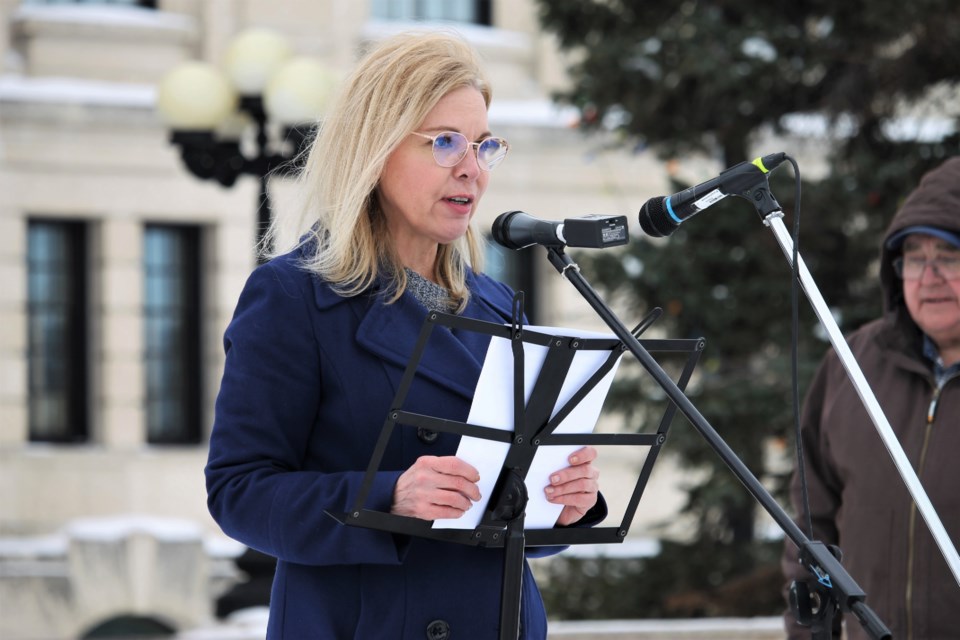REGINA — A moment of silence descended on the front steps of the Saskatchewan legislative building Saturday, interrupted only by the music and honking of anti-vaccine demonstrators set-up further down the street.
Those gathered on the steps, many wearing masks and all standing in vigil, did not let the noise deter the heavy air surrounding them.
They were there to remember all the lives lost to COVID-19 on the two-year anniversary of the first presumptive case reported in the province, a public event organized locally to pay respects for loved ones.
For Karen Hoiland, who lost her husband Robert Watson about a year ago to COVID, the vigil and it's message was an appreciated gesture.
“I think it's important that we take these moments, just to recognize not just the people that we’ve lost but the people that are left behind that need our support,” said Hoiland.
Hoiland said Watson, a retired photojournalist formerly with the Regina Leader-Post, would have loved the Irish blessing included in the words offered by Rev. Cam Fraser, of the Knox Metropolitan United Church.
“My husband was so big on anything Irish, he loved everything Irish,” said Hoiland. “It was really, really special that happened today.”
Four community leaders spoke at the vigil, including Fraser, and Hoiland said hearing words of comfort from each speaker was poignant, for anyone who has been negatively affected by the pandemic.
“I found a lot of what they said to be touching,” said Hoiland. “It was lovely, and quite moving.”
Organizer Deb Nyczai felt that the vigil was something necessary for the community, for those who are still working through their personal grief, even as provincial officials continue to talk about COVID ramifications in the context of statistics.
“We just needed to pay our respects,” said Nyczai. “We’ve all struggled through this, but none more so than those who lost a loved one.”
A cumulative total of 1,151 individuals have passed due to COVID in Saskatchewan since the pandemic began, said Nyczai, and 37,207 people have lost their lives nationwide.
“That’s actually the population of communities like Cardiff, the rural municipality of Snipe Lake, or Grenfell or Kerrobert,” said Nyczai. “The number of Canadians who have died due to COVID is equivalent to the entire population of Prince Albert and the village of Muenster.”
She said that terming these statistics as just numbers may mean people can’t realize the breadth of that loss.
“Everyday we hear these numbers, but these are people and not just numbers,” said Myczai. “They’re someone’s mother or father, grandparent, a son or daughter, a friend or colleague.”
She also said that the numbers don’t offer insight into how many people are being affected by COVID-19 deaths, as each person lost leaves behind an average of nine close relatives, according to an American statistic.
“Many have been denied the familiar ritual of mourning, such as bedside goodbyes and in-person funerals,” said Nyczai. “We’re here to show those family and friends that we care, we grieve with them.”
Hoiland agreed, adding that there’s incredible importance to focusing on the humanity behind what’s being reported about the pandemic.
“This is a huge event in history, but these are souls and our loved ones that we have lost,” said Hoiland. “Our families are going to be thinking of this for many years to come.”
Offering prayers from multiple faiths was also a priority, said Nyczai. She wanted the event to open itself to every part of the community, in solidarity with anyone seeking comfort.
“We are in such a diverse community, for one, but also because COVID didn’t care what religion you were or where you came from,” said Nyczai. “It was important to represent that.”
Fraser said that for many, the process of healing from the pandemic will include, in addition to grieving loss, a path of reconciliation where polarizing opinions have left divides.
“People have had to make hard decisions and lard boundaries that perhaps have not been received well,” said Fraser. “That’s just a reality that people will struggle with, with those strained relationships.”
He said he hopes that this public showing of respect for those left in the aftermath of COVID-19 will offer a message of empathy.
“It’s an invitation to be compassionate, and a recognition that we are collectively and individually carrying so much grief,” said Fraser.



